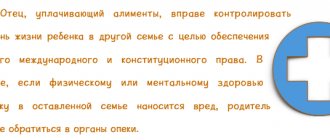Definition of the concept of “Alimony”
There is no definition of the concept of “alimony” in Russian legislation.
The definition of the concept of “alimony” was previously contained in the Methodological Recommendations of the FSSP of the Russian Federation dated March 10, 2006 N 12/01-2115-NV “On the procedure for executing writs of execution on the collection of alimony” (currently the document is not applied):
Alimony is money for the maintenance of minor children or adult disabled family members.
The RF IC does not provide a clear definition of the concept of “alimony”. At the same time, from a comparison of the provisions of the Family Code of the Russian Federation, the following definition of the concept of “alimony” can be derived:
Alimony is a citizen’s funds, which, under the control of the state, are subject to redistribution in favor of needy, socially vulnerable members of his family.
Other authors offer the following definition of the concept of “alimony”:
Alimony is material support that is required by law to be provided by one person to another due to the existing marital and other family relationships between them (for example, parents to children, children to parents, one spouse to another, some family members to other needy disabled family members).
The alimony obligation is understood as a legal relationship arising from an agreement of the parties or a court decision, by virtue of which some family members are obliged to provide maintenance to other members, and the latter have the right to demand it.
Alimony fund
Since 2012, the President has been raising the issue that it is necessary to amend the legislation and create a specialized fund to provide payments to children whose parents avoid obligations. Today a corresponding bill has been prepared. It is assumed that payments with its help will be made during the period of time while the relevant services are looking for the father or mother and forcing them to fulfill their obligations to the child.
Video
The amount of monetary support will not be less than the amount that is charged to a working parent who evades obligations. The previous method of calculating the amount of child support for all categories of parents will remain the same. No new Presidential Decrees have been issued in this regard.
It is not yet clear what the fund's source of funding will be. It is planned to increase the state fee for divorce. The minimum wage can be 30,000 rubles. This amount will be charged to both parents.
Employers may be required to make transfers to the new fund. Payments will be made in the same way as transfers to the social insurance fund. Money can be obtained with the help of government subsidies to the regions, funds from the subjects themselves, as well as with the involvement of money from private individuals. They plan to introduce a similar method of replenishing the fund in Moscow. The amount paid from the fund will be withheld from the debtor. He will be obliged to reimburse the funds, taking into account all penalties and other fines. A minor whose parent refuses to pay child support and is hiding from the law may qualify for a survivor's pension. To do this, you need to go to court and declare the missing parent dead. However, such a process is preceded by a lengthy search for the defaulter.
The concepts of “maintenance” and “alimony”
From the above definitions of the concept of “alimony” it follows that the concept of “alimony” means the provision of maintenance on the basis of both a court decision and an agreement to pay alimony.
At the same time, the concept of “maintenance” is broader in scope than the concept of “alimony”.
But sometimes the legislator bypasses the term “alimony”, replacing it with the definition “maintenance”. Yes, Art. 157 of the Criminal Code of the Russian Federation speaks of malicious evasion of payment of funds for the maintenance of children or parents.
The concepts of “maintenance” and “alimony” as equivalent definitions are also used in the Family Code of the Russian Federation (see the rules of law in paragraph 4 of article 30 of the RF IC, paragraph 1 of article 42 of the RF IC, paragraphs 1 - 3 of article 80 of the RF IC , paragraphs 1 - 2 of Article 89 of the RF IC).
In the legislation of some foreign countries, for example Germany, the definitions of “alimony” and “maintenance” are also identified.
We recommend: articles, comments, reviews of judicial practice, samples of statements of claim, see the section “Alimony for a child, spouse. Amount, calculation, collection"
What innovations were adopted
In order to tighten penalties for non-compliance with alimony payment requirements in 2021, the Russian Government has adopted a program for developing new regulations aimed at optimizing the processes of collecting funds for children and needy family members.
The project is designed for 10 years, among the implemented measures are:
- introduction of Article 157 of the Criminal Code of the Russian Federation on the application of punishment for committing a crime - malicious failure to pay alimony for a period of more than 4 months in a row;
- consideration of amendments by the State Duma to increase the age up to which funds are collected for children under 23 years of age upon confirmation of enrollment in higher educational institutions, the law was adopted in two readings, but was not finally adopted, its signing was postponed;
- establishment of measures to introduce restrictions on driving a vehicle and traveling abroad when accumulating debt of more than 10,000 rubles. when a corresponding decision is made by the bailiff, the ban on driving a vehicle does not apply to citizens for whom this represents a professional activity or disabled people who use a car for transportation, living in hard-to-reach places and for transporting children to educational institutions;
- creation of new information databases for recording debtors, in particular, through the website of the Federal Bailiff Service, a single portal of State Services, social networks.
Cases of collection of alimony
Family law provides for the following cases of collection of alimony:
- for the maintenance of minor children by one of the parents after divorce (Article 24 of the RF IC). According to Art. 80 of the RF IC and non-divorced parents can pay alimony to their young children;
- from parents for the maintenance of adult disabled children (Article 85 of the RF IC);
- from adult children in favor of disabled parents in need of help (Article 87 of the RF IC);
- from one of the spouses in favor of the other disabled spouse in need (Article 89 of the RF IC);
- for the maintenance of the wife during pregnancy and for 3 years from the date of birth of a common child (Article 89 of the RF IC);
- in favor of the former spouse under certain conditions, for example, if the former spouse became disabled before the divorce or within a year from the date of divorce (Article 90 of the RF IC);
- from brothers and sisters, grandparents, grandchildren, pupils, stepsons and stepdaughters (Articles 93 - 97 of the RF IC).
Will child support be canceled in 2021?
One of the most popular topics regarding alimony legislation was a petition to abolish alimony, published in April 2021 on the popular resource change.org. The authors of the initiative are representatives of the “Egalitarian Men’s Movement,” whose goal is to protect men’s rights.
According to the authors of the petition, alimony policy leads to the collapse of Russian families as follows:
- The number of divorces is increasing - instead of reaching an agreement with each other, parents are getting divorced.
- A parent living with a child and receiving alimony prevents the other parent (usually the father) from communicating with the minor.
- Despite the strict alimony policy, the number of debtors is not decreasing.
The protection of motherhood and childhood is one of the highest priorities in Russia, so it is unlikely that the issue of abolishing alimony will be considered in 2020. As of November 2021, the petition has been signed by more than 16,000 people, indicating that this initiative is not particularly popular in society.
Reducing and increasing the amount of alimony. A fixed amount of money
The size of the shares specified in Article 81 of the RF IC may be reduced or increased by the court, taking into account the financial or marital status of the parties and other noteworthy circumstances.
Collection of alimony is also possible in a fixed amount of money (clause 1 of Article 83 of the RF IC).
Please note that currently alimony in a fixed amount is collected not in the minimum wage (minimum wage), but in an amount that is a multiple of the subsistence level. See in more detail the comments to Article 117 of the Family Code of the Russian Federation
We recommend publications on this issue:
- Child support from salary and in the absence of income
- Little alimony from a small salary!
- Not enough alimony? Is it possible in a fixed amount of money?
- Collection of alimony in a fixed amount. Arbitrage practice
- Reducing the amount of child support. Arbitrage practice
- Reducing the amount of alimony due to the payer’s illness
Claims for alimony are now heard in district courts
On October 1, 2021, amendments to the procedural legislation came into force, as a result of which the categories of cases assigned to the jurisdiction of magistrates changed.
Disputes regarding alimony have been excluded from the jurisdiction of magistrates; now claims for alimony should be filed in the district court. At the same time, the consideration of applications for the issuance of a court order for alimony remained within the competence of magistrates.
Let us explain, if you want to collect alimony in proportion to the debtor’s earnings, provided that he has not yet paid other alimony, you should contact the magistrate’s court with an application for a court order. In all other cases, claims related to the payment of alimony will now be considered in district courts.
The reason for excluding alimony cases from the jurisdiction of magistrates is the high percentage of cancellations and changes in their decisions. In 2019, decisions of magistrates on the collection of alimony in the district court were canceled and changed:
- in 65% of cases due to the court’s incorrect determination of the circumstances relevant to the case;
- in 16% of cases due to violation or incorrect application of substantive law;
- in 9% of cases due to violation or incorrect application of procedural law.
That is why, when resolving disputes regarding alimony, we recommend consulting with a professional family lawyer. Official statistics confirm that judges do not always make fair decisions. Every 11th decision on alimony is overturned on appeal, and every 7th decision is changed. A qualified specialist will help defend your rights in courts of all instances. You can contact our lawyers at: +7 (495) 722-99-33 or via WhatsApp.
It is expected that as a result of such changes in jurisdiction, the efficiency of consideration of cases will increase, decisions on alimony will be canceled and changed less often. The actual results of the judicial reform can be judged at the beginning of 2021.
Types of earnings from which alimony is withheld
Article 82 of the RF IC specifies: the types of earnings and (or) other income that parents receive in rubles and (or) in foreign currency and from which alimony is withheld for minor children in accordance with Art. 81 of this Code are determined by the Government.
Today, there is a List of types of wages and other income from which alimony for minor children is withheld, approved by Decree of the Government of the Russian Federation of July 18, 1996 N 841.
Under consideration
Let's consider what changes in legislation can await us in the near future. Whose interests will be affected?
Foreclosing on the only home
The Russian Ministry of Justice is developing, at the request of the Constitutional Court, a bill on confiscation of the only housing from debtors. Currently, collection cannot be applied to the only housing of citizens, but when it comes to socially significant proceedings, for example, collection of alimony, many disputes arise. This issue began to be actively discussed after the decision of the Constitutional Court of the Russian Federation dated May 14, 2012, which recognized that the ban on foreclosure on the debtor’s only residence should not apply to those cases where the size of the residential premises significantly exceeds the average and the cost is sufficient to satisfy property claims against the debtor without prejudice to his right to housing. Thus, it is expected to develop mechanisms that expand the possibilities of collecting funds from alimony debtors. It is clarified that this bill will not affect loan debtors.
Debtors of alimony with a single home of large areas can be moved to apartments of a smaller area, and due to the difference in cost, the existing alimony debt can be paid off. The difficulty is that judges in such situations will need to establish the amount of money due to the debtor for the purchase of a new home according to established standards. It is assumed that for the court to make such a decision, the owner must have twice the area required for each member of his family. Such changes in legislation are necessary to eliminate the imbalance of interests of the debtor and the claimant.
Special account closed to bailiffs
Despite the fact that the current legislation clearly states what income cannot be levied on, for example, survivor benefits, maternity capital, payments to citizens injured in the line of duty, the problem of writing off such funds by bailiffs as debt repayment exists. Of course, no one has canceled the right to challenge such a penalty, but in reality this is quite difficult and time-consuming. Therefore, it is proposed to create special accounts, untouchable for bailiffs, where the above payments will be transferred. This bill will also protect bankrupt debtors. The money in such a special account will not be included in the bankruptcy estate, and creditors will not be able to collect it for debts.
Alimony - no more than 20% of salary
State Duma deputies proposed improving the mechanism for state protection of the rights of alimony payers and their family members. It is assumed that for citizens with two or more dependent children, the amount of alimony collected in court cannot exceed 20% of wages and (or) other income. Currently, the amount of child support for all minor children cannot exceed 50% of wages and other income, and the maximum amount of deduction from wages and other income cannot exceed 70%. The amount of such deductions may jeopardize the maintenance of other dependents of the debtor, for whom alimony has not been awarded by court.
Samples of statements of claim for the collection of alimony
- Statement of claim for the recovery of alimony for a child (children)
- Statement of claim for the recovery of alimony for two children in a fixed amount
- Statement of claim for the recovery of child support during marriage
- Statement of claim for the recovery of alimony in a fixed amount for a child
For other examples of claims for the collection of alimony for the maintenance of a spouse, a former spouse, for the maintenance of parents, grandparents, grandsons, granddaughters, as well as for the collection of alimony penalties, for divorce, division of property, and determination of the child’s place of residence, see the section: “ Claims for the recovery of alimony .”
Possibility of opening a social account
Currently, bailiffs, in order to collect arrears of alimony, block all accounts opened with credit institutions in the name of the paying parent. However, their intended purpose is not clear. At the same time, the details can be used to transfer those funds that are not subject to deduction from alimony. Most often this is:
- pensions in connection with the loss of a breadwinner by the payer;
- child support for another child;
- compensation payments related to injury to health.
In mid-2021, a bill was introduced to create special social accounts. It was planned to open special accounts for “alimony recipients”, inviolable for bailiffs, into which income that was not subject to deduction could be purposefully credited. The final adoption of the project was planned for January 2021, but until now this has not happened.
Administrative and criminal liability for non-payment of alimony
Administrative liability for non-payment of alimony without good reason is provided for in Article 5.35.1 of the Code of Administrative Offenses of the Russian Federation. This article provides for liability for non-payment of maintenance funds:
- minor children;
- disabled children who have reached the age of eighteen;
- disabled parents.
In this case, the obligation to pay alimony should arise on the basis of:
- a judicial act, including a court decision, a court order, a resolution on the collection of alimony before the court decision on the collection of alimony enters into legal force;
- a notarized agreement on the payment of alimony.
The condition for bringing to administrative responsibility is failure to pay alimony for two or more months after the initiation of enforcement proceedings and in the absence of signs of a crime under Article 157 of the Criminal Code of the Russian Federation.
For more information about some of the issues that arise in judicial practice when considering cases of administrative offenses related to non-payment of funds for the maintenance of children or disabled parents, see Resolution of the Plenum of the Supreme Court of the Russian Federation dated April 27, 2021 N 6
Criminal liability for non-payment of alimony without good reason is provided for in Art. 157 of the Criminal Code of the Russian Federation. Unlike administrative liability, criminal liability for non-payment of alimony occurs only if there is a sign of repetition , that is, the alimony payer is subject to criminal liability for non-payment of alimony if he was previously subjected to administrative punishment for a similar act, during the period when the person is considered subject to administrative punishment.
Other amendments to the law on child support
Additionally, the possibility of extending the age until which parents are required to support a child is being considered. In this case, the adjustments will not be related to work ability. Previously, child support was terminated after the child reached 18 years of age. The period could be extended only if an adult child was unable to work for medical reasons. Today the rules are planned to change. If a child enrolls in full-time education, the period for providing child support is extended to 23 years. In this case, funds are provided in a fixed form.
It does not matter whether the son or daughter is studying on a budgetary or commercial basis. It does not matter whether the university is state-owned.
By agreement of the parties, alimony may be provided as a share of wages.









